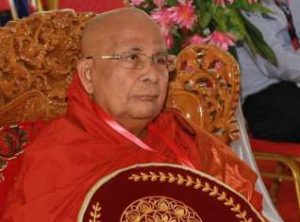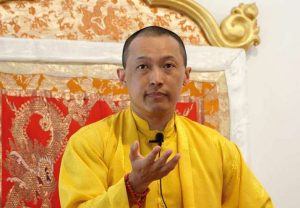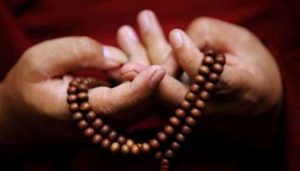
Jiang Wu, professor in the department of East Asian Studies and director of the Center for Buddhist Studies at the University of Arizona, has been awarded a 2023 Guggenheim Fellowship. As part of the award, Wu will receive US$60,000 to help fund the “Scripture and Modernity: The Obaku Buddhist Canon in East Asia and the West” project, which examines the writings delivered by Yinyuan Longqi (1592–1673) from China to Japan, which helped lead to the founding of Obaku-shu, one of three major schools of Japanese Zen Buddhism originating in China.
In response to the news, Wu stated that it was a “gratifying moment that comes after so many years of hard work and research.” (The University of Arizona)
He continued: “It is very special for me to receive this award, this year, because the subject matter I am researching is Buddhist canon brought by a Chinese monk, Yinyuan Longqi, in the 17th century to Japan—and this year is the 350th anniversary of his death. It is also the 150th anniversary of the Japanese Iwakura Mission to America and Europe, which facilitated the transfer of the reproduced Obaku Canon from Japan to the Indian Office Library in Britain.” (The University of Arizona)
Jiang Wu, Professor of @uaeastasian and Director of the @uarizona Center for Buddhist Studies (@UACBSofficial), will use the award to further research the impact of 17th century Buddhist monk Yinyuan Longqi: https://t.co/5Z0g6Lrv46
— UA Humanities (@uahumanities) April 6, 2023
Wu, who plans to see his project turn into a book, noted that his work would further our understanding of humanity through better knowledge of this important religious figure and the ideas that emerged from the tradition.
“My study tackles the interaction and reaction of the religious world toward modernization, focusing on scripture,” he said. “How does scripture become modernized? How does it become an expression, or a legacy of people’s spirituality?” (The University of Arizona)
Wu holds bachelor’s and master’s degrees from Nankai University in China and a doctorate from Harvard University. He specializes in 17th century Chinese Buddhism, in particular Chan/Zen, the interplay between culture and canon formation, and the exchange of ideas between Chinese and Japanese Buddhists. He is also a scholar of Confucianism, Chinese history, and digital humanities.
Alain-Philippe Durand, Dorrance Dean of the College of Humanities, said: “We’re so pleased to see Jiang Wu recognized as a Guggenheim Fellow. His expertise in Chinese Zen Buddhism and the Chinese Buddhist canon is internationally recognized and as the founding director of the Center for Buddhist Studies, he has helped position the University of Arizona as a hub for research and teaching. We are tremendously proud of the reputation that such exceptional scholars bring to the College of Humanities.” (The University of Arizona)
Albert Welter, head of the Department of East Asian Studies, added that Wu’s fellowship was a “major accomplishment and recognition of Dr. Wu’s world-class scholarship.” Welter continued: “Dr. Wu has been pioneering studies on the East Asian Buddhist canon for years and through his efforts, has established it as a major research area within Buddhist Studies.” (The University of Arizona)
Reflecting on his colleagues and experience in Arizona, Wu said, “I am really happy with this result and thankful for university president Robbins, the College of Humanities, the Department of East Asian Studies, and all of my wonderful colleagues for all the support I have received.” (The University of Arizona)
Wu is among 171 scientists, writers, scholars, and artists who were awarded 2023 Guggenheim Fellowships, representing a total of 48 scholarly disciplines and artistic fields, 72 academic institutions, 24 US states and the District of Columbia, as well as two Canadian provinces.
Past scholars of Buddhism who have won the fellowship include: Jacob Dalton, a scholar of Tibetan Buddhism who won the award in 2014; Bryan J. Cuevas, an historian of religion focusing on premodern Tibet, who won in 2013; Justin McDaniel, who focuses on popular religion and material culture in Thai Buddhism, who won in 2012; Todd Lewis, a scholar of Nepal’s Buddhism, who won in 2011; Gregory P. A. Levine, who covers Japanese Buddhist visual culture and texts, who won in 2010; and Kenneth James Saunders, a scholar of Buddhist art, who won the award in 1925 and 1926.
The Center for Buddhist Studies and the College of Humanities at the University of Arizona will host a series of exhibitions on the life and legacy of Longqui through May this year. Wu is scheduled to speak on the Obaku Buddhist Canon and modern Buddhist canon compilations in East Asia on 18 April. The talk will be accessible online and in-person.
Read more
UArizona East Asian studies professor awarded 2023 Guggenheim Fellowship (The University of Arizona)
The Japanese Ōbaku Canon 黃檗藏 And Modern Buddhist Canon Compilations In East Asia (The University of Arizona)
Meet Our 2023 Fellows (John Simon Guggenheim Memorial Foundation)
Related news reports from BDG
Center for Buddhist Studies at the University of Arizona Announces Expansion, Fundraising Effort
University of Arizona Announces Awards and Fellowships with Funding From Lingyin Temple in China














